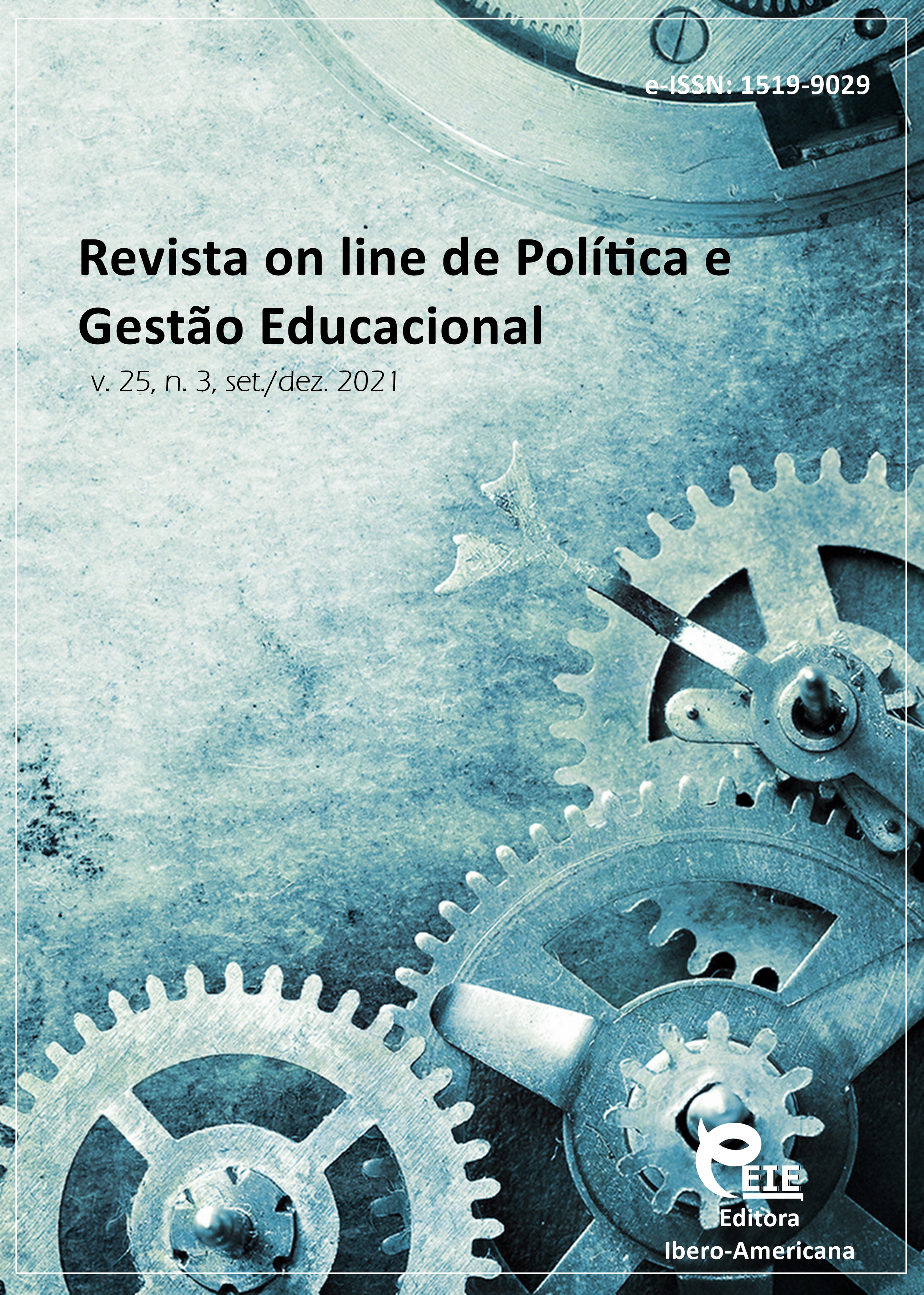Sobre o desenvolvimento de habilidades cognitivas e a regulação do comportamento de crianças de cinco e seis anos
DOI:
https://doi.org/10.22633/rpge.v25i3.15926Palavras-chave:
Inteligência não verbal, Memória de trabalho, Controle inibitórioResumo
O artigo analisa o desenvolvimento de habilidades cognitivas e regulação do comportamento em crianças de cinco e seis anos. Os autores delinearam as especificidades do desenvolvimento de habilidades cognitivas e regulação do comportamento de pré-escolares. No Bloco 1, mediu-se o nível de desenvolvimento intelectual. O Bloco 2 incluiu diagnósticos de desenvolvimento de habilidades cognitivas. No Bloco 3, avaliou-se a compreensão pelas crianças de suas emoções e pensamentos e sentimentos e os de outras pessoas usando métodos de diagnóstico desenvolvidos para crianças pré-escolares e adaptados por Veraksa, Bukhalenkova e Almazova. Os autores usaram subtestes do complexo de diagnóstico neuropsicológico NEPSY-II para avaliar o desenvolvimento mental de crianças de 3 a 16 anos e criaram as normas para desenvolvimento de habilidades cognitivas e regulação do comportamento adaptadas para determinada região russa. Os resultados podem ser usados como base para o planejamento de atividades correcionais e de desenvolvimento com crianças em idade pré-escolar.
Downloads
Referências
AARON, P. G. et al. Diagnosis and treatment of reading disabilities based on the component model of reading: An alternative to the discrepancy model of LD. Journal of Learning Disabilities, Dallas, v. 41, n. 1, p. 67-84, 2008. DOI: https://doi.org/10.1177/0022219407310838
ALMAZOVA, O. V.; BUKHALENKOVA, D. A.; VERAKSA, A. N. The voluntariness in the preschool age: A comparative analysis of various approaches and diagnostic tools. National Psychological Journal, Moscow, v. 4, n. 24, p. 14-22, 2016. DOI: https://doi.org/10.11621/npj.2016.0402
ALMAZOVA, O. V.; BUKHALENKOVA, D. A.; VERAKSA, A. N. Diagnostika urovnya razvitiya regulyatornykh funktsiy v starshem doshkol'nom vozraste [Assessment of the Level of Development of Executive Functions in the Senior Preschool Age]. Psihologija. Žurnal Vysšej školy èkonomiki [Psychology. Journal of the Higher School of Economics], Moscow, v. 16, n. 2, p. 94-109, 2019. Available: https://psy-journal.hse.ru/en/2019-16-2/292253790.html. Access: 9 Dec. 2021.
ANDERSON, P. Assessment and Development of Executive Function (EF) During Childhood. Child Neuropsychology, Calgary, v. 8, n. 2, p. 71-82, 2002. DOI: https://doi.org/10.1076/chin.8.2.71.8724
BLAIR, C.; RAZZA, R. P. Relating Effortful Control, Executive Function, and False Belief Understanding to Emerging Math and Literacy Ability in Kindergarten. Child Development, Minneapolis, v. 78, n. 2, p. 647-663, 2007. DOI: https://doi.org/10.1111/j.1467-8624.2007.01019.x
CUTTING, L. E. et al. Effects of fluency, oral language, and executive function on reading comprehension performance. Annals of Dyslexia, Toronto, v. 59, n. 1, p. 34-54, 2009. DOI: https://doi.org/10.1007/s11881-009-0022-0
DEDYUKINA, M. I.; IVANOVA, M. K. Diagnostičeskij instrumentarij izučenija kognitivnoj i èmocionalʹnoj sfer razvitija detej 5-6 let [Diagnostic tools for studying the cognitive and emotional spheres of the development in five and six-year-olds]. Problemy sovremennogo pedagogičeskogo obrazovanija [Problems of Modern Pedagogical Education], n. 67-1, p. 295-298, 2020.
DRUZHININ, V. N. Kognitivnye sposobnosti: Struktura, Diagnostika, Razvitie [Cognitive Abilities: Structure, Diagnostics, Development]. Moscow: Per Sè [PerSe], 2001.
FELDSTEIN, D. I. Glubinnye izmenenija sovremennogo detstva i obuslovlennaja imi aktualizacija psihologo-pedagogičeskih problem razvitija obrazovanija [Deep changes in modern childhood and the resulting actualization of psychological and pedagogical problems of education development]. Vestnik praktičeskoj psihologii obrazovanija [Bulletin of Practical Psychology of Education], Moscow, v. 8, n. 4, p. 3-12, 2011. Available: https://psyjournals.ru/vestnik_psyobr/2011/n4/56243.shtml. Access: 9 Dec. 2021.
FRYE, D.; ZELAZO, P. D.; PALFAI, T. Theory of mind and rule-based reasoning. Cognitive Development, Greensboro, v. 10, n. 4, p. 483-527, 1995. DOI: https://doi.org/10.1016/0885-2014(95)90024-1
GARDNER, H. E. Intelligence reframed: Multiple intelligences for the 21st century. Hachette, UK, 2000.
HONEYWILL, R. The man problem: Destructive masculinity in western culture. New York: Palgrave Macmillan, 2015.
KELLY, G. The рsychology of рersonal сonstructs. New York: Norton, 1955.
KLOO, D.; PERNER, J. Training Transfer Between Card Sorting and False Belief Understanding: Helping Children Apply Conflicting Descriptions. Child Development, Minneapolis, v. 74, n. 6, p. 1823-1839, 2003. DOI: https://doi.org/10.1046/j.1467-8624.2003.00640.x
MASLENNIKOV, V. A. Development of intellectual abilities of younger schoolchildren. Veliky Novgorod: Novgorod State University, 2004.
MIYAKE, A. et al. The Unity and Diversity of Executive Functions and Their Contributions to Complex “Frontal Lobe” Tasks: A Latent Variable Analysis. Cognitive Psychology, Amherst, v. 41, n. 1, p. 49-100, 2000. DOI: https://doi.org/10.1006/cogp.1999.0734
OZEROV, V. P.; SOLOVYEVA, O. V. Diagnostika i formirovanie poznavatelʹnyh sposobnostej: Učebnoe posobie [Diagnostics and the formation of students’ cognitive abilities: A textbook]. Stavropol: Stavropol-Servis-Shkola, 1999.
PIAGET, J. Rech i myshlenie rebenka. Moscow: Rimis, 2008. Original title: The language and thought of the child.
PULKKINEN, L. Female and male personality styles: a typological and developmental analysis. Journal of Personality and Social Psychology, Washington, v. 70, n. 6, p. 1288-1306, 1996. DOI: https://doi.org/10.1037/0022-3514.70.6.1288
RUBINSTEIN, S. L. Osnovy obŝej psihologii [Fundamentals of general psychology]. St. Petersburg: Piter, 2002.
SNOW, K. L. Measuring school readiness: Conceptual and practical considerations. Early Education and Development, London, v. 17, n. 1, p. 7-41, 2006. DOI: https://doi.org/10.1207/s15566935eed1701_2
SYRNIKOVA, N. A. [On the comprehensive interpretation of intelligence]. In: SYRNIKOVA, N. A. [Memoirs of Novgorod State University: Collection of articles]. Veliky Novgorod: Novgorod State University, 1999. In Russian.
WIMMER, H.; PERNER, J. Beliefs about beliefs: Representation and constraining function of wrong beliefs in young children's understanding of deception. Cognition, Davis, v. 13, n. 1, p. 103-128, 1983. DOI: https://doi.org/10.1016/0010-0277(83)90004-5
Downloads
Publicado
Como Citar
Edição
Seção
Licença
Copyright (c) 2021 Revista on line de Política e Gestão Educacional

Este trabalho está licenciado sob uma licença Creative Commons Attribution-NonCommercial-ShareAlike 4.0 International License.
Manuscritos aceitos e publicados são de propriedade da Revista on line de Política e Gestão Educacional. É vedada a submissão integral ou parcial do manuscrito a qualquer outro periódico. A responsabilidade do conteúdo dos artigos é exclusiva dos autores. É vedada a tradução para outro idioma sem a autorização escrita do Editor ouvida a Comissão Editorial Científica.











